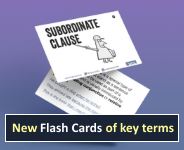Explanation
Verbs constitute one of the major word classes, including words for actions (e.g. shout, work, travel) and states (e.g. be, belong, remain). There are two main types of verb: main verbs and auxiliary verbs.
The surest way to identify verbs is by the ways they can be used: they can usually have a tense, either present tense or past tense (see also future).
- He lives in Birmingham. [present tense]
- The teacher wrote a song for the class. [past tense]
Verbs are sometimes called ‘doing words’ because many verbs name an action that someone does; while this can be a way of recognising verbs, it doesn’t distinguish verbs from nouns (which can also name actions). Moreover many verbs name states or feelings rather than actions.
- He likes chocolate. [present tense; not an action]
- He knew my father. [past tense; not an action]
Not verbs:
- The walk to Halina’s house will take an hour. [noun]
- All that surfing makes Morwenna so sleepy! [noun]
Verbs can be classified in various ways: for example, as auxiliary verbs, or modal verbs; as transitive verbs or intransitive verbs; and as states or events.
Irregular verbs form their past tense typically by a change of vowel (e.g. break-broke, see-saw, eat-ate). Be aware that in the National Curriculum a sequence of one or more auxiliaries together with a main verb are regarded as forms of the main verb. For example, have eaten is a form (the perfect form) of the verb eat, and will have been being seen is a form of the verb see. In other frameworks such sequences are regarded as verb phrases.
Englicious contains many resources for English language in schools, but the vast majority of them require you to register and log in first. For more information, see What is Englicious?

